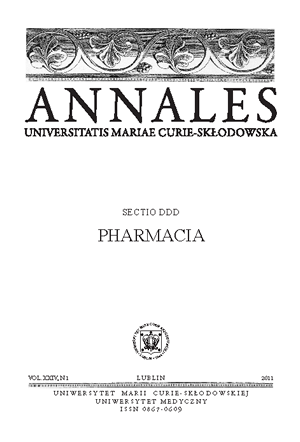Zaburzenie zachowań wywołane deksametazonem: efekt ACTH4-9
Słowa kluczowe:
glikokortykosteroidy, deksametazon, ACTH4-9, testy zachowań, neurodegeneracja, neuroprotekcja, myszyAbstrakt
Długotrwałe stosowanie glikokortykosteroidów (GCs) i ich preparatów, takich jak: deksametazon, może wywoływać neuronalne uszkodzenia mózgu, szczególnie hipokampa (struktury bogatej w receptory dla GCs), odgrywającej ważną rolę w pamięci, nastroju i zachowaniach.
Wcześniejsze badania wskazują na neuroprotekcyjne działanie ACTH4-9 -(syntetyczny adrenokortykotropowy-4-9-analog) w ośrodkowych i obwodowych modelach neuronalnej degeneracji. Celem tego eksperymentu było zbadanie wpływu ACTH4-9 (w dawce 50 mg/kg stosowanej 2 razy w tygodniu) na zaburzone efekty zachowań myszy poddanych przewlekłemu działaniu DEX. Wyniki tych badań wykazały, że DEX (w dawkach 8 lub 16 mg/kg/dobę przez 14 dni) zaburzał koordynację motoryczną (w teście „komina”), aktywność lokomotoryczną podczas 60 min obserwacji, jak również zmniejszał nabywanie pamięci w teście biernego unikania (szczególnie w dawce 16 mg/kg/dobę). Ponadto, DEX, w każdej dawce, wywoływał znaczną śmiertelność i zmniejszał ciężar ciała myszy podczas 28 dniowego eksperymentu. ACTH4-9 poprawiało parametry w testach zachowań ale nie zmniejszało śmiertelności myszy. Powyższe dane potwierdzają neuroprotekcyjne właściwości ACTH4-9.
Bibliografia
1. Antonawicz F.J., Miller G., Gigsby D.C. et al.: Regulation of ischemic cell death by glucocorticoids and adrenocorticotropic hormone. Neurosci., 88, 319, 1999.
2. Abrahám I., Veenema A.H., Nyakas C. et al.: Effect of corticosterone and adrenalectomy on NMDA-induced cholinergic cell death in rat magnocellular nucleus basalis. J. Neuroendocrinol., 9, 713, 1997.
3. Boissier J.R., Tardy J., Diverres J.C.: Une nouvelle méthode simple pour explorer l´action “tranquillisante”: le test de la cheminée. Méd. Exp. (Basel), 3, 81, 1960.
4. Brown E.S., Rush A.J., McEwen B.S.: Hippocampal remodeling and damage by corticosteroids: implications for mood disorders. Neuropsychopharmacol., 21, 474, 1999.
5. Chen J., Adachi N., Tsubota S. et al.: Dexamethasone augments ischemia- induced extracelluralar accumulation of glutamate in gerbil hippocampus. Eur. J. Pharmacol., 347, 67, 1998.
6. Danilczuk Z., Ossowska G., Wróbel A. et al.: Glucocorticoids modulate behavioral effects induced by dopaminergic agonists in rats. Pol. J. Pharmacol., 53, 467, 2001.
7. Danilczuk Z., Ossowska G., Łupina T. et al.: Effect of NMDA receptor antagonists on behavioral impairment induced by chronic treatment with dexamethasone. Pharmacol. Rep., 57, 47, 2005.
8. Danilczuk Z., Sekita-Krzak J., Łupina T. et al.: Influence of dizocilpine (MK-801) on neurotoxic effect of dexamethasone: Behavioral and histological studies. Acta Neurobiol. Exp., 66, 215, 2006.
9. De Quervain D.J., Roozendaal B., McGaugh J.L.: Stress and glucocorticoids impair retrieval of long-term spatial memory. Nature, 394, 787, 1998.
10. De Wied D., De Kloet E.R.: Pro-opiomelanocortin (POMC) as homeostatic control system. Ann. NY Acad. Sci., 521, 328, 1987.
11. Flavin M.P.: Influence of dexamethasone on neurotoxicity caused by oxygen and glucose deprivation in vitro. Exp. Neurol., 139, 34, 1996.
12. Griffiths M.R., Cooper A.J., Barber D.J. et al.: Pharmacological mechanisms mediating phencyclidine-induced apoptosis of striatopallidal neurons: the roles of glutamate, dopamine, acetylcholine and cortocosteroids. Brain Res., 855, 1, 2000.
13. Hamers F., Pette Ch., Neijt J.P. et al.: ACTH-(4-9) analog, ORG 2166, prevents taxol-induced neuropathy in rats. Eur. J. Pharmacol., 233, 177, 1993.
14. Haynes L.E., Griffiths M.R., Hyde R.E. et al.: Dexamethasone induces limited apoptosis and extensive sublethal damage to specific subregions of the striatum and hippocampus: implications for mood disorders. Neurosci., 104, 57, 2001.
15. Herz R.C.G., Kasbergen C.M., Versteeg D.H.G. et al.: The effect of the adrenocorticotropin-(4-9) anlogue, ORG 2766, and of dizolcipine (MK-801) on infarct volume in rat brain. Eur. J. Pharmacol., 346, 159, 1998.
16. Horváth K.M., Abraham I.M., Harkany T. et al.: Postnatal treatment with ACTH (4-9) analog ORG 2766 attenuates N-methyl-D-aspartate-induced excitotoxicity in rats nucleus vasalis in adulthood. Eur. J. Pharmacol., 405, 33, 2000.
17. Hwang I.K., Yoo K.Y., Park J.K. et al.: Ischemia-related changes of adrenocorticotropic hormone immunoreactivity and its protective effect in gerbil hippocampus after transient forebrain ischemia. Neurosci. 126, 871, 2004.
18. McIntosh L.J., Sapolsky R.: Glucocorticoids increase the accumulation of reactive oxygen species and enhance adriamycin-induced toxicity in neuronal culture. Expl. Neurol., 141, 201, 1996.
19. Newcomer J.W., Selke G., Melson A.K. et al.: Decreased memory performance in healthy humans induced by stress-level cortisol treatment. Arch. Gen. Psychiatry, 56, 527, 1999.
20. Sekita-Krzak J., Żebrowska-Łupina I., Czerny K. et al.: Neuroprotective effect of ACTH(4-9) in degeneration of hippocampal nerve cells caused by dexamethasone: morphological, immunocytochemical and ultrastructural studies. Acta Neurobiol. Exp., 63, 1, 2003.
21. Stengs C.H.M., Klis S.F.L., Huizing E.H. et al.: Protecive effects of a neurotrophic ACTH4-9 analog on cisplatin ototoxicity in relation to the cispaltin dose: an electrocochleographic study in albino guinea pigs. Hearing Res., 124, 108, 1998.
22. van Rijzingen I.M., Gispen W.H., Dam R. et al.: Chronic and intra-amygdala administrations of the ACTH4-9 analog OR 2766 modulate behavioral changes after manipulation of NMDA-receptor activity. Brain Res., 22, 200, 1996.
23. van Rijzingen I.M., Gispen W.H., Spruijt B.M. The ACTH(4-9) analog ORG 2766 and recovery after brain damage in animal models – a review. Behav. Brain Res., 74, 1, 1996.
24. Venault P., Chapouthier G., de Carvalho L.P. et al.: Benzodiazepines impair and betacorbolines enhance performance in learning and memory tasks. Nature, 321, 864, 1986.
25. Wolkowitz O.M., Reus V.I., Canick J. et al.: Glucocorticoid medication, memory and steroid psychosis in medical illness. Ann. NY Acad. Sci., 823, 81, 1997.
26. Żebrowska-Łupina I., Pietrasiewicz T., Ossowska G. et al.: ACTH4-9 analogue facilitates the antiimmobility effect of antidepressants and dopamine agonists in swimming rats. J. Physiol. Pharmacol., 48, 263, 1997.
Pobrania
Opublikowane
Numer
Dział
Licencja
Prawa autorskie (c) 2011 Autorzy

Praca jest udostępniana na licencji Creative Commons Attribution-NonCommercial-NoDerivatives 3.0 Unported License.


